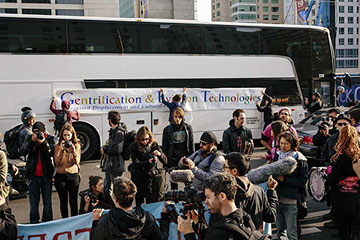
Protesters who blame tech wealth for San Francisco's soaring housing costs blockade a private shuttle filled with Google employees.
(2 of 4)
The 1,800-odd tech companies in San Francisco are doing wonders for the local economy, generating capital and funneling revenue into city coffers through their giant conferences, property taxes and hotel bills. And high-paid, high-skilled tech jobs are creating other jobs. Enrico Moretti, an economist at the University of California, Berkeley, analyzed about 10 million workers in 220 metro areas and estimated that every tech job ultimately supports five additional ones. Construction workers on Market, many hammering away on projects that broke ground after Twitter moved in, often eat at Sam's Diner. Two years ago, owner Jeannie Kim says, the restaurant could have gotten by with one server on the floor. Now it has four. On the cycle goes. Today the city's unemployment rate is 4.8%, about half what it was two years ago.
But this success has come at a cost. The place columnist Herb Caen called an "enchanting, troubled, gallant little city" has limitations that most other big cities don't. Its 49 sq. mi. (127 sq km) would fit inside New York City six times. And the local government has long indulged development-averse residents, fighting tall, dense buildings while preserving rows of quaint Victorian houses. "That's where San Francisco as a city has failed," says Moretti. "By constraining the amount of new housing, San Francisco has essentially pushed up the price of housing."
For example, the entire West Bay region added 26,700 jobs from December 2012 to December 2013. Yet only 6,000 new housing units are currently under construction in San Francisco. Consequently, housing costs have gone through the roof. The median rent for an apartment is now $3,475, according to Zillow, and home values have gone up more than 16% in the past year. The average listing price for a house in Pacific Heights, where Oracle billionaire Larry Ellison and Apple design guru Jonathan Ive make their beds, topped $12.5 million in early January, according to Trulia. In other parts of town, the less fortunate are flouting building codes and making homes wherever they can. "Look to see what San Franciscans are now renting," says local developer Patrick Kennedy, "laundry rooms, broom closets."
In up-and-coming neighborhoods like the Mission, where the taquerias and bodegas of the working-class Latino population are now neighbors to artisanal ice cream shops and boutique chocolatiers, some residents paying below-market rents are being pushed out fast. Citywide, no-fault evictions are up 123% from last year, as landlords and developers use legal loopholes to evict tenants and skirt the city's strong rent-control laws.
The prices for other goods are rising too, as businesses shift and cater to a class for whom money is less of an object. People stand in line for individually hand-poured drip coffee that costs $3 per 10-oz. (295 ml) cup. Residents can use their smartphones to summon cars organized by Lyft, Sidecar or Uber; at peak times, the latter may charge a $40 minimum fare no matter the distance. A restaurant selling $4 toast recently ignited a debate about the local cost of living that inspired San Francisco magazine to riff on Dr. Seuss: "Is tony tech toast really at fault?/ For this should we force economics to halt?/ Of course what we need is a city affordable/ But are luxury goods and their buyers deplorable?"
